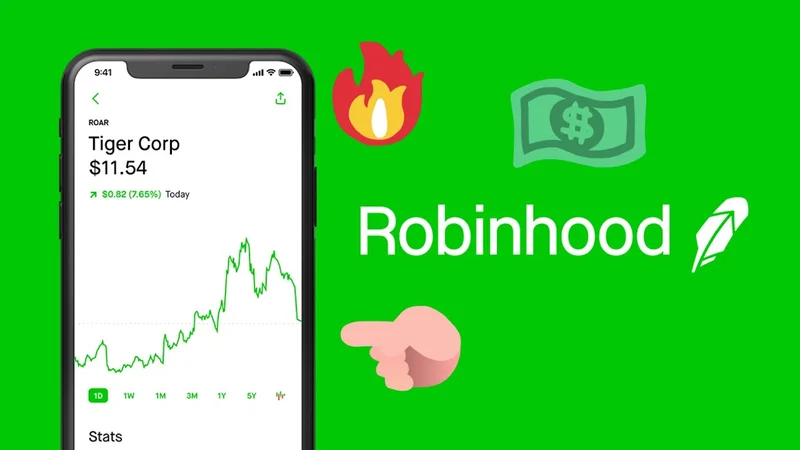Beyond the Ticker: Why Robinhood's Stock Price Misses the Entire Point
I’ve been watching the conversation around Robinhood lately, and it feels like we’re having two completely different discussions at once. On one side, you have Wall Street analysts, peering through their spreadsheets at the Robinhood stock price, muttering about P/E ratios being twice the S&P 500 average and pointing to shaky job market data as a sign of impending doom. They see a stock "priced for perfection" and, understandably, get nervous.
But on the other side is a story that you can’t capture in a quarterly report. It’s a story about a fundamental, irreversible shift in our relationship with money, technology, and power. And when I look at Robinhood, I don’t just see a fintech company. I see the public face of a quiet revolution. To obsess over questions like 'Should You Buy Robinhood While It's Below $150?' is like trying to value the printing press by counting the number of Bibles it sold in its first year. You’re measuring the artifact, not the paradigm shift it represents.
The Anatomy of a Movement
Let’s get the numbers out of the way, because they are impressive, but not for the reasons you think. Robinhood now has over 26 million funded accounts. Its premium Robinhood Gold service just hit 3.5 million subscribers, a 76% jump in a year. Revenue per user is climbing. These aren’t just metrics; they are the vital signs of a movement gaining critical mass.
When I first saw these growth figures, I honestly just sat back in my chair, speechless. Because what I see isn’t a company acquiring customers. I see a generation that was told for decades that the world of investing was a private club, with high fees as the gatekeepers and arcane language as the secret handshake, suddenly realizing they can just walk through the front door. The Robinhood app became the key. This is a behavioral change, not a business cycle. It's the "democratization of finance"—in simpler terms, it means the tools once reserved for the wealthy are now a utility, as accessible as electricity or water.
This is the kind of breakthrough that reminds me why I got into this field in the first place. We're witnessing the rewiring of financial habits on a massive scale. People aren’t just buying a few shares of TSLA or NVDA on a whim; they are building a native fluency in markets. They’re setting up a Robinhood Roth IRA on their lunch break. They’re using the Robinhood card for groceries. What happens when 50 million people view managing their own capital not as a complex chore delegated to a man in a suit, but as a simple, integrated part of their daily digital life? What does that future look like?

More Than an App, It's an Ecosystem
The real genius here isn't just commission-free Robinhood trading. That was the Trojan horse. The true, long-term vision is the creation of a frictionless financial ecosystem. This is where the comparison to old-guard brokers like Fidelity or Schwab completely falls apart. Those were destinations you went to for a specific service. Robinhood is building a habitat you live in.
This integration is the real breakthrough, because it removes the friction that kept people siloed in old-school banks for decades and it creates a flywheel effect where every new product makes the entire ecosystem more valuable, more sticky, and more essential to daily life. It’s the Amazon model. Amazon didn’t just want to sell you a book; it wanted to build the underlying infrastructure for all of commerce, and then offer you everything from cloud computing to movie streaming on top of it. Similarly, Robinhood isn't just offering you a stock trade; it's building the infrastructure for your entire financial identity.
Of course, with this new power comes immense responsibility. The "gamification" of investing is a legitimate concern, and the debate around payment for order flow is one we must continue to have. Building a platform that is simple and engaging is a tightrope walk—one side is empowerment, the other is exploitation. It's a line that Robinhood, and we as a society, must navigate with extreme care and transparency. Are they a perfect company? No. But are they a pivotal one? Absolutely.
The question isn't whether the economy will have a soft or hard landing next quarter. The question is, ten years from now, will more people be managing their own financial lives, or fewer? Will finance be more integrated into our digital world, or less? The answers seem obvious.
The Real Asset Isn't the Stock
So, let's stop asking if Robinhood is overvalued based on last month's job report. It's the wrong question. The stock price will bounce around—that's what stocks do. But the underlying cultural shift is a one-way street.
The real asset Robinhood has isn't its technology or its brand. It's the trust and habituated behavior of 26 million people, most of whom will never go back to the old way of doing things. They are the leading indicator of a future where financial autonomy is the default, not the exception. The debate over the stock price is just noise. The signal is the sound of millions of people taking control. And that’s a revolution you can’t put a price-to-earnings ratio on.
